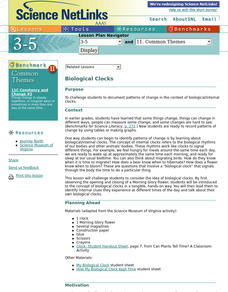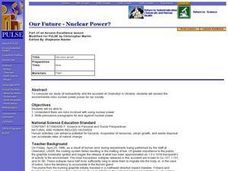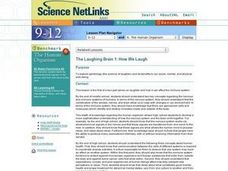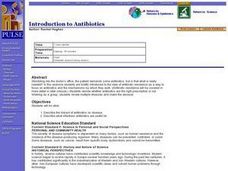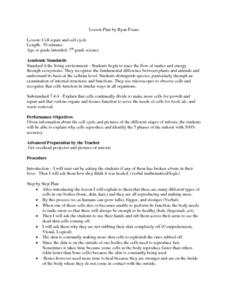Curated OER
Life Processes and Water
Young scholars examine the function and nature of water as it effects all living things.
Curated OER
Feedback and Flowcharts
Sixth graders explain what a negative feedback system is and they distinguish it from a positive feedback system. They describe examples of how negative feedback is used in both nature and technology. , Students define homeostasis, and...
Curated OER
Reproduction
For this reproduction worksheet, students review the processes involved with sexual reproduction in animals and pollination in plants. This worksheet has 6 fill in the blank, 5 true or false, and 9 short answer questions.
Curated OER
Water 1: Water and Ice
Learners investigate water in its solid and liquid form. In this states of matter lesson, students experiment to see what happens as water goes from a solid, ice, to a liquid, water, and back again. They write about and illustrate the...
Curated OER
Our Future - Nuclear Power?
Students comprehend that there are risks involved with using nuclear power. They write persuasive paragraphs for and against nuclear power. Students analyze the environmental issues and risks with nuclear power.
Curated OER
Can You Beat Jet Lag?
Students examine the health condition of jet lag. Using mealworms, they test the effect of light on the development of them into adults. They answer discussion questions and examine the relationship of age and one's activity level.
Curated OER
The Laughing Brain 1: How We Laugh
Students to rate themselves on a scale from 1 to 10 (10 being the happiest) as to how happy they feel and write their rating on a sheet of paper. They explore gelotology (the science of laughter) and its benefits to our social, mental,...
Curated OER
Introduction to Antibiotics
Students describe the impact of antibiotics on disease. They describe what infections antibiotics are useful for. Students are introduced to the idea of antibiotic resistance as a way to focus on antibiotics and the mechanisms by which...
Curated OER
The Seven Characteristics of Life
Third graders investigate the characteristics of living and nonliving things. They conduct a research quest in order to identify the seven characteristics of life. Then students pick one aspect and use it to create a song meant to be...
Curated OER
The United Nations
Students are introduced to the role of the United Nations. Using the internet, they research its history and its influence on politics and peace. In groups, they create a timeline of significant United Nations conventions since World...
Curated OER
Science: Entomology in Action
Students discover how coroners use insect life cycles to estimate the time of death in cases. they describe how forensic entomologists combine environmental factors with insect life cycles to note the changes. Students examine an...
Curated OER
Mathematics In You
Students construct ratios using the hand as data. They use examples of cortical and trabecular bone found in the long bones to measure circumference, diameter, length, and weight of long bones. They perform computations using growth...
Curated OER
Cell Repair and Cell Cycle
Seventh graders explore the cell cycle. They view pictures of different stages of mitosis and explain why cells reproduce. They identify the five phases of mitosis: interphase, prophase, metaphase, anaphase, and telophase.
Curated OER
Pulse
Students determine a baseline pulse rate then chart the changes in rate with exercise. They describe the changes and develop a rationale for their observations. The task assesses students' abilities to make simple observations, determine...





